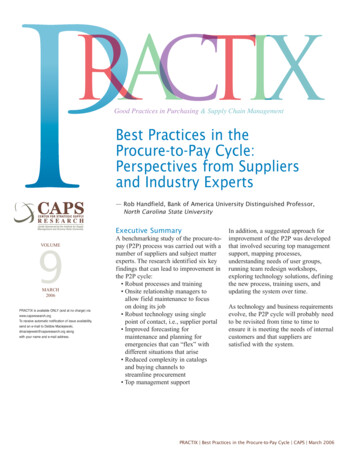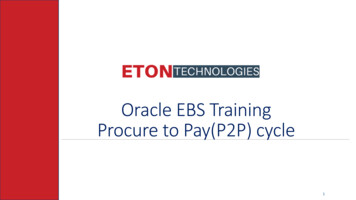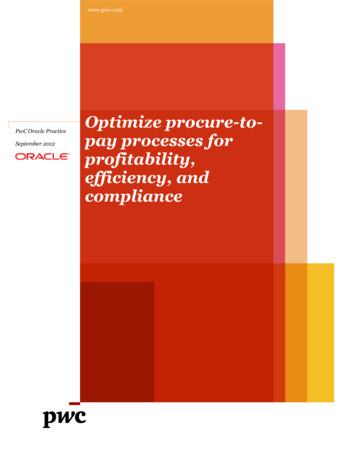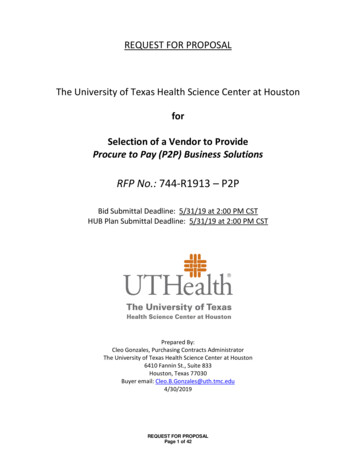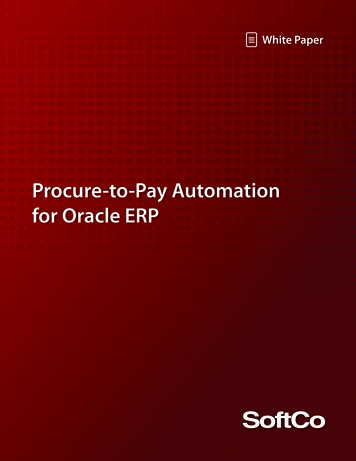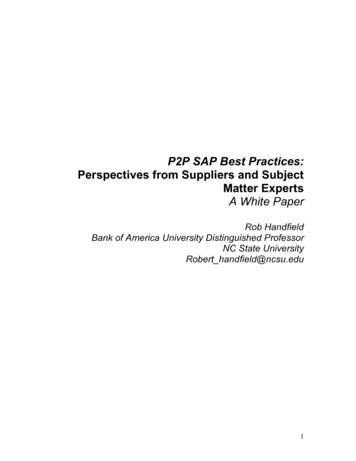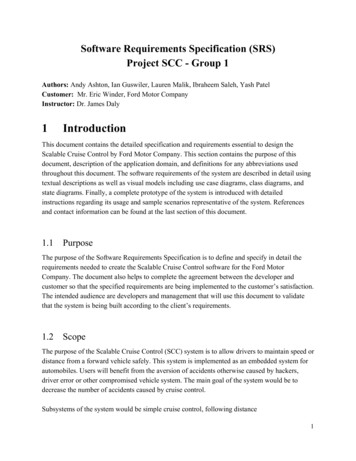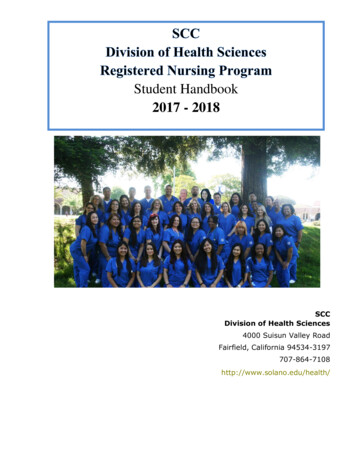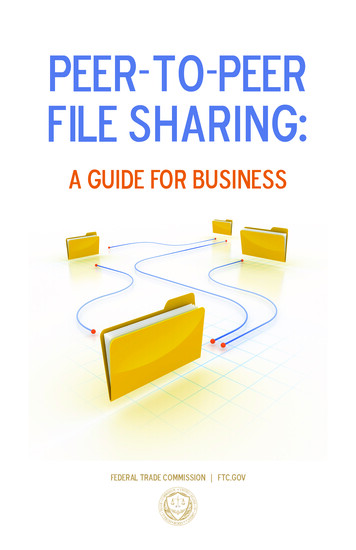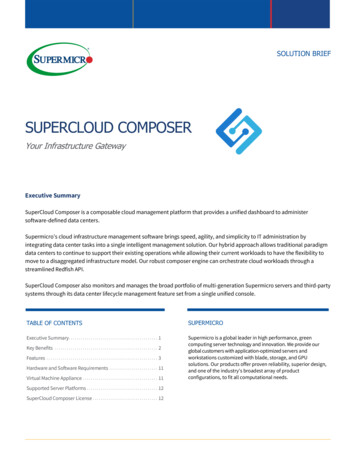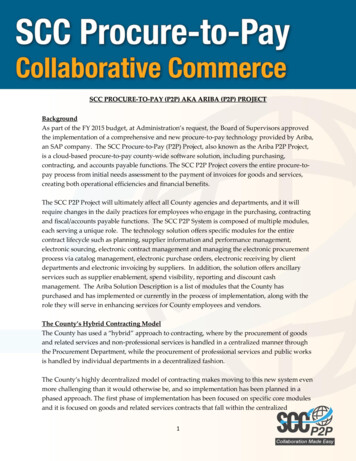
Transcription
SCC PROCURE-TO-PAY (P2P) AKA ARIBA (P2P) PROJECTBackgroundAs part of the FY 2015 budget, at Administration’s request, the Board of Supervisors approvedthe implementation of a comprehensive and new procure-to-pay technology provided by Ariba,an SAP company. The SCC Procure-to-Pay (P2P) Project, also known as the Ariba P2P Project,is a cloud-based procure-to-pay county-wide software solution, including purchasing,contracting, and accounts payable functions. The SCC P2P Project covers the entire procure-topay process from initial needs assessment to the payment of invoices for goods and services,creating both operational efficiencies and financial benefits.The SCC P2P Project will ultimately affect all County agencies and departments, and it willrequire changes in the daily practices for employees who engage in the purchasing, contractingand fiscal/accounts payable functions. The SCC P2P System is composed of multiple modules,each serving a unique role. The technology solution offers specific modules for the entirecontract lifecycle such as planning, supplier information and performance management,electronic sourcing, electronic contract management and managing the electronic procurementprocess via catalog management, electronic purchase orders, electronic receiving by clientdepartments and electronic invoicing by suppliers. In addition, the solution offers ancillaryservices such as supplier enablement, spend visibility, reporting and discount cashmanagement. The Ariba Solution Description is a list of modules that the County haspurchased and has implemented or currently in the process of implementation, along with therole they will serve in enhancing services for County employees and vendors.The County’s Hybrid Contracting ModelThe County has used a “hybrid” approach to contracting, where by the procurement of goodsand related services and non-professional services is handled in a centralized manner throughthe Procurement Department, while the procurement of professional services and public worksis handled by individual departments in a decentralized fashion.The County’s highly decentralized model of contracting makes moving to this new system evenmore challenging than it would otherwise be, and so implementation has been planned in aphased approach. The first phase of implementation has been focused on specific core modulesand it is focused on goods and related services contracts that fall within the centralized1
operations of the Procurement Department. Although these contracts are centralized in theirsolicitation and execution, all departments utilize them for their procurement and paymentactivity, and so the implementation of this first phase remains a truly Countywide effort.Administration Oversight of Implementation and RolloutAdministration is closely monitoring the project because of its Countywide nature, the uniquecomplexity associated with such a system, the importance of reliability in a system that willhandle vital contracting and fiscal transactions, and the need to support culture change indepartments across the County as implementation occurs.The Procurement Department and Finance Controller-Treasurer Department play key roles andhave primary responsibility over the business processes involved in the various modules thatare implemented. Because of the Countywide nature of the SCC P2P Project, the CountyExecutive and Chief Operating Officer served as Executive Sponsors. The Steering Committeewas co-chaired by the Deputy County Executive and the Finance Director with criticalparticipation from Procurement, Controller-Treasurer Department, Information ServicesDepartment (ISD), Health and Hospital System (HHS) Finance and the SCC P2P Project team.The daily work of implementation is led by the Core Management Team, with major leadershipfrom the Procurement Director and Controller-Treasurer. Staff from Procurement, Finance, ISD,and HHS are involved on a daily basis, working in teams dedicated to the implementation ofeach module.2
ARIBA MODULES WITH IMPLEMENTATION DATESModule/WorkflowPhaseSupplier InformationManagement (Core Module)1TechnicalImplementationDateJanuary 2015Discount Professional CashManagement (ancillary)Sourcing Professional (CoreModule)Procure-to-Pay Module forTransactional Procurementwith SAP integration to FMModule (Core Module)1January 2015March 20151June 2015July 20151October 2015October 2015Supplier Enablement(ancillary)Cataloging (Punchout and CIF)1On-goingContracts Module withDocuSign for ElectronicSignatures (Core Module)2CommencedDecember 2014CommencedMarch 2015March 2016Procurement Workspace(Workflow)Supplier PerformanceManagementSpend Visibility (ancillarymodule)2March 2016May 20163June 2017September 20173December 2016January 201713Phased RolloutCommencementDateApril 2015On-goingMay 2016
FIVE MAIN ELEMENTS WHICH HELPED THE TEAM SUCCESSFULLYIMPLEMENT AFTER A ROCKY START WITH IMPLEMENTATION1. Procurement “solution” vs. Ariba module implementation Address the complexity of fully integrated “To Be” Procurement and Financesolution at SCC (See next page) Business Process Workshops driving clarity on SCC end-to-end processes2. One Team, looking forward not back One Team SCC SAP Ariba, pulling together to deliver successful solution forSCC Build on SAP relationship and history at SCC3. Transparency, honesty and facing reality Say what we can Do, realistically, and Do what we Say Direct insights into SAP-Ariba product roadmap, enhancement and support4. SAP-Ariba investment in SCC success Significant focus and additional resources provided from Ariba and SAPleadership and delivery 30 Enhancement Requests being considered for Ariba enhancement releases andproduct roadmap5. Increased focus on scope, project, issue and change management Strengthen SCC and SAP-Ariba project management foundation to drive projectexecution4
5
BRANDING, MARKETING, AND CHANGE MANAGEMENTBrandingThe goal of change management is to help Procurement staff, clients and suppliers impacted bythe change to make a successful transition, given what is required by the solution.As part of the effort to be inclusive in the SCC P2P Project, a slogan contest within thedepartments (Procurement, Finance and Information Services Department) was followed by thecreation of the SCC P2P logo. 17 submissions were received, and the winner slogan was SCCP2P Collaboration Made Easy. To increase brand awareness, the logo and slogan have beenused consistently for all materials related to the Project.MarketingSCC P2P impacts all County Departments. At the beginning stage of the Projectimplementation, the Procurement Leadership Team met with the department heads andprovided compelling justification as to why the change was happening, communicated a clearunderstanding of the goals and objectives of the change, and provided sufficient resources forthe departments to be successful during the transition.Understanding the importance of support from the impacted employees and managerscountywide, and involvement early in the process increased support from many levels andcontract staff from all departments were identified and invited to be the champions of theProject. They attended the system demonstration and training, and were encouraged to sharewhat they learned to the other staff. Providing information and tools to the champions hasempowered them to promote the Project in their respective departments.When the Sourcing Module was first implemented in Procurement in July 2015, not only wasextensive training provided to staff, there were workshops conducted by the Project Leadstwice a week to work with individual staff who had a bidding project. These workshopsprovided one-on-one support and allowed the individuals to ask questions freely.Throughout the Project, the Procurement Leadership Team has communicated effectively withstaff and provided update on each milestone of the Project. Besides keeping staff informed via6
regular emails and staff meetings, the Leadership Team has held a retreat to permit all staffto step away from their daily tasks and focus on the upcoming changes by the Project, anddiscuss the essential action required for a successful transition.The P2P Module Wave 2 Roll-Out Plan was implemented in January 2016 after the P2P modulewas successfully piloted by two County departments as Wave 1. At Wave 2, ten departmentswith the largest spend were identified. Presentations were conducted by the Project Team atthese ten departments. Information packets and promotional items were provided to thedepartment staff at these presentations. Comments from the departments were all positive. Asof August 31, 2016, the P2P Module has been rolled our Countywide and more than 575 staffhave been trained in various roles.In May 2015, Procurement collaborated with the Finance Team and the Ariba Team toconduct the Vendor Outreach Fair. Approximately 100 vendors attended this event to learnabout the SCC P2P Project. To ensure the vendors were registered on the Ariba System,computers were set up at the Fair, so that the vendors could easily register on-site and one-onone support by staff was provided to the vendors throughout the registration process.In 2016, Procurement has developed a comprehensive Vendor Outreach Plan to engage withthe vendors. One of the major activities of this Plan is to conduct quarterly Workshops toeducate the vendors about the procurement, contracting processes and business opportunitiesin the County and update them about the SCC P2P Project. Two workshops were held inMarch and July 2016 and many of them took the opportunity and registered on the AribaSystem after the Workshop.TrainingTraining is the foundation for building knowledge about the change, and developing therequired skills necessary to succeed. Identifying the people who will be impacted and needingto be trained is a primary role of change management. Working in partnership with the AribaChange Management Senior Consultant, SCC developed its internal change managementstrategies and plan. The Ariba Consultant, with input from SCC technical and functional teammembers developed training materials, quick reference guides (QRG) and webinars for eachmodule that was deployed. Ariba provided at least one Consultant Trainer-led classroom7
training to selected or nominated users, super users or trainers (train the trainers) once themodule was pushed to production. Based on feedback, the materials were revised and updated;SCC then accepted and confirmed completion of delivery from Ariba to SCC Project team. TheSCC functional leads along with the technical leads updated the training materials as necessaryduring adoption. Changes are driven by technical and/or process due to systemimprovement/enhancement or policy changes.To date, Ariba and SCC have developed training materials and/or quick reference guides for thefollowing modules:ModuleTraining Materials &Activity GuidesQuick ReferenceGuidesWebinarsP2P – Requisition toReceiving (R2R) andInvoicingX1212SourcingX10Contract Compliance6SIM4ContractsX78
9
#MakeProcurement10wesome
contracting, and accounts payable functions. The SCC P2P Project covers the entire procure-to-pay process from initial needs assessment to the payment of invoices for goods and services, creating both operational efficiencies and financial benefits. The SCC P2P Project will ultimately affect all County agencies and departments, and it will
